
Boogie Down Productions (BDP) was an American hip hop group originally composed of KRS-One, D-Nice, and DJ Scott La Rock. DJ Scott La Rock was murdered on August 27, 1987, five months after the release of BDP's debut album, Criminal Minded. The name of the group, Boogie Down, derives from a nickname for the South Bronx section of New York City. The group pioneered the fusion of dancehall reggae and hip hop music and their debut LP Criminal Minded contained frank descriptions of life in the South Bronx during the late 1980s, thus setting the stage for what would eventually become gangsta rap.
The new school of hip hop was a movement in hip hop music, beginning in 1983–84 with the early records of Run–D.M.C., Whodini, and LL Cool J. Predominantly from Queens and Brooklyn, it was characterized by drum machine-led minimalism, often tinged with elements of rock; rapped taunts, boasts, and socio-political commentary; and aggressive, self-assertive delivery. In song and image, its artists projected a tough, cool, street b-boy attitude. These elements contrasted sharply with funk and disco, novelty hits, live bands, synthesizers, and party rhymes of artists prevalent in the early 1980s. Compared to their older hip hop counterparts, new school artists crafted more cohesive LPs and shorter songs more amenable to airplay. By 1986, their releases began to establish hip hop in the mainstream.

Criminal Minded is the debut studio album by hip-hop group Boogie Down Productions, released on March 3, 1987 by B-Boy Records. It is considered a highly influential hip hop album and one of the first in the gangsta rap genre.

"Self Destruction" is the only single by the Stop the Violence Movement, a group formed by American rapper KRS-One in 1988 in response to violence in the hip hop and African American communities.

By All Means Necessary is the second album from American hip hop group Boogie Down Productions, released in April, 1988 on Jive Records. After the 1987 murder of DJ-producer Scott La Rock, MC KRS-One moved away from the violent themes that dominated Boogie Down Productions' debut, Criminal Minded, and began writing socially conscious songs using the moniker the Teacher.
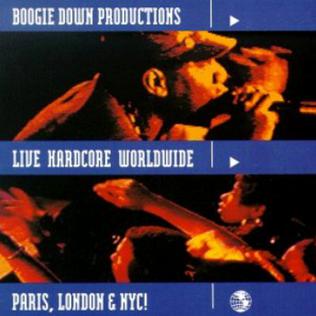
Live Hardcore Worldwide is a live album released by Boogie Down Productions. It is a career-spanning collection that was recorded in the US, Paris and London. The release features KRS-One prominently.
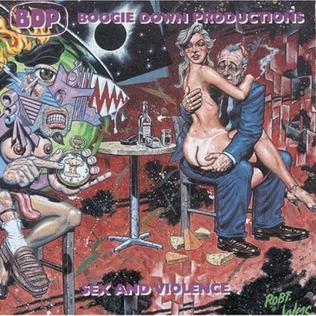
Sex and Violence is the fifth and final album released by hip hop group Boogie Down Productions. The next year, 1993, the group's lead member, KRS-One, would begin recording under his own name.

Knowledge Is King is the third solo studio album by American rapper Kool Moe Dee, released on May 30, 1989, via Jive Records.

Funke, Funke Wisdom is the fourth solo studio album by American recording artist Kool Moe Dee from the Treacherous Three. It was released in 1991 via Jive Records, making it the rapper's final album on the label.
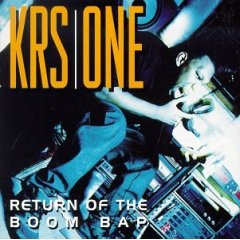
Return of the Boom Bap is the debut solo studio album by American rapper KRS-One, released on September 28, 1993 by Jive Records. Recording sessions took place at D&D Studios and at Battery Studios in New York. Production was handled by DJ Premier, Kid Capri, Norty Cotto, Showbiz and KRS-One himself. It features guest appearances from Ill Will and Kid Capri. The album peaked at number 37 on the Billboard 200 and number 5 on the Top R&B/Hip-Hop Albums in the United States.

Ms. Melodie, the stage name of Ramona Parker, was an American emcee. She was associated with KRS-One's group Boogie Down Productions (BDP) and was for a time married to KRS-One. She was described by Vibe as "one of the ladies who could sonically spar with the fellas, spit raw lyrics, rhyme from a female's perspective, and hold their own."

KRS One is the second solo studio album by American rapper KRS-One. It was released on October 10, 1995, via Jive Records. Production was handled by DJ Premier, Diamond D, Big French Productions, Norty Cotto, Showbiz and KRS-One himself. It features guest appearances from Busta Rhymes, Channel Live, Das EFX, Dexter Thibou, Fat Joe and Mad Lion.

I Got Next is the third solo studio album by American rapper KRS-One. It was released on May 20, 1997, via Jive Records. Production was handled by Domingo, Jesse West, Showbiz, Gordon "Commissioner Gordon" Williams, DJ Cipher, DJ Muggs, Thembisa, and KRS-One himself. It features guest appearances from Redman, Angie Martinez, Mic Vandalz, Thor-El and Puff Daddy.
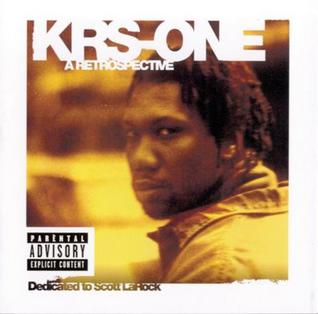
A Retrospective is a compilation album by American rapper and record producer KRS-One. It was released on August 22, 2000 via Jive Records, and composed of previously released songs from the rapper's previous studio albums as part of Boogie Down Productions, as well as his solo studio albums. The track "Essays on BDP-Ism" was the last track ever featured DJ Scott La Rock.

The Sneak Attack is the fourth solo studio album by American musician KRS-One. It was released on April 24, 2001 via Koch Records. Recording sessions took place at Unique Recording Studios in New York and at Embassy Recording Studios in Los Angeles, with additional recording at 7888 Recording Studio in Woodhaven, Queens. Production was handled by Kenny Parker, Domingo, BJ Wheeler, Fredwreck, Grand Daddy I.U., Mad Lion, MC Jazzy Jeff, and KRS-One himself.
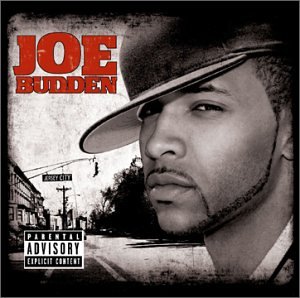
Joe Budden is the debut studio album by American rapper Joe Budden. It was released on June 10, 2003, by On Top, distributed by Def Jam. Recording sessions took place from 2002 to 2003, with production by Dub B aka White Boy, along with the other high-profile producers such as Just Blaze and Lofey. The album features guest appearances from Lil' Mo, Busta Rhymes and 112. Upon the record's release, it was met with favorable reviews from music critics. Joe Budden debuted at number 8 on the US Billboard 200, selling 95,000 units in its first week, later the record sold 420,000+ copies in the United States. It also entered at number 55 on the UK Albums Chart.
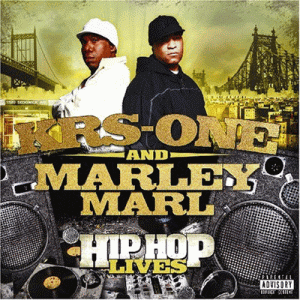
Hip Hop Lives is the collaborative studio album by American rapper KRS-One and record producer Marley Marl. It was released on May 22, 2007 via Koch Records. Recording sessions took place at House Of Hits in New York and at Westlake Recording Studios in Los Angeles. Production was handled by Marley Marl himself, except for one track produced with 88 Fingers. It features guest appearances from Blaq Poet, Busy Bee Starski and Magic Juan. The album's title is a response to Nas's 2006 album Hip Hop Is Dead.
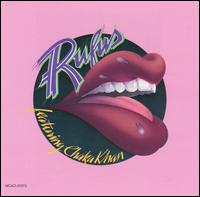
Rufus featuring Chaka Khan is the gold-selling fourth studio album by the funk band Rufus and Chaka Khan, released on the ABC Records label in 1975. It remained on top of the R&B album chart for six consecutive weeks.

Maximum Strength is the tenth solo studio album by American rapper KRS-One. It was released on June 10, 2008 via Koch Records. Production was handled by Duane "DaRock" Ramos, James Desmond, Dirt, Oh No and Ser Kenoe, with Simone Parker serving as executive producer. The name Maximum Strength was originally the title for an album recorded by KRS-One in 1998-1999 for Jive Records that still remains unreleased. When promoting this album in 2008 it was said to finally be a release of the shelved LP and the label even posted track lists and cover very different from the final release.

Lawrence "Kris" Parker, better known by his stage names KRS-One and Teacha, is an American rapper from the South Bronx. He rose to prominence as part of the hip hop group Boogie Down Productions, which he formed with DJ Scott La Rock in the mid-1980s. KRS-One is known for his songs "Sound of da Police", "Love's Gonna Get'cha ", and "My Philosophy". Boogie Down Productions received numerous awards and critical acclaim in their early years. Following the release of the group's debut album, Criminal Minded, fellow artist Scott La Rock was shot and killed, but KRS-One continued the group, effectively as a solo project. He began releasing records under his own name in 1993. He is politically active, having started the Stop the Violence Movement after La Rock's death. He is also a vegan activist, expressed in songs such as "Beef". He is widely considered an influence on many hip-hop artists.


















